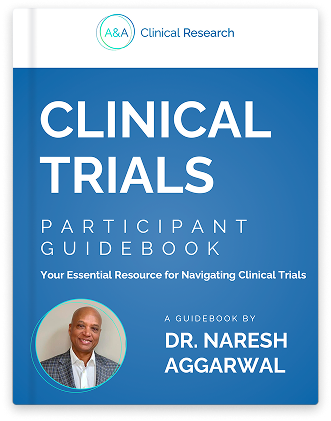Patient Resources and Support
At A&A Clinical Research, we are dedicated to providing patients with the knowledge and support needed to navigate clinical trials confidently. This page offers key resources, including a comprehensive patient guide and FAQs, to help you understand the trial process, safety measures, and participation benefits. Additionally, we highlight the importance of diversity in research and what sets A&A Clinical Research apart in delivering patient-centric, community-driven care.
Clinical Trials FAQs
These FAQs provide a basic overview of clinical trials, but if you’re considering participating in one, you should talk to your healthcare provider and the trial coordinators to get more detailed information relevant to your situation.
A clinical trial is a research study that aims to evaluate a medical, surgical, or behavioral intervention. It’s the primary way that researchers find out if a new treatment, like a new drug, diet, or medical device (for example, a pacemaker), is safe and effective.
They might also compare a new treatment to a treatment that is already available.
Clinical trials are conducted to collect data regarding the safety and efficacy of new drug and device development. Before Health Canada / U.S. Food and Drug Administration (FDA) approve a new drug or device for the public, it must first successfully pass through a series of clinical trial phases. These trials are critical for developing treatments for various diseases and conditions.
Eligibility criteria for a clinical trial vary widely and depend on the study’s objectives. These criteria can include stage of a disease, previous and current treatment history, and other medical conditions. This ensures that researchers achieve reliable results.
Benefits:
- Contribute to Medical Science: Play a direct role in the future of healthcare.
- Receive potentially groundbreaking treatments before they’re widely available.
- Benefit from close monitoring by a team of medical professionals.
- Eligible participants may be reimbursed for travel costs during their participation.
Risks:
- There may be side effects to experimental treatments.
- There’s always a possibility that the treatment may not be effective for you, or it may not be more effective than existing treatments.
- In some clinical trials, you might receive a placebo instead of the actual treatment. While this is crucial for the research’s integrity, it means you might not receive any therapeutic benefit.
The ethical and legal codes that govern medical practice also apply to clinical trials. In addition, most clinical research is federally regulated with built-in safeguards to protect the participants. Trials follow carefully controlled protocols, a study plan which details what researchers will do in the study. As a clinical trial progresses, researchers report the results of the trial at scientific meetings, to medical journals, and to various government agencies. Each trial must be approved and monitored by an Institutional Review Board (IRB) to ensure that the risks are minimal.
The clinical trial process depends on the kind of trial being conducted. The study research team includes doctors, research coordinators and phlebotomists. They check the health of the participant at the beginning of the trial, give specific instructions for participating and monitor the participant carefully for the duration of the study.
Clinical trials are conducted in phases, each with a different purpose:
- Phase I trials test a new biomedical intervention for the first time in a small group of people (20-80) to evaluate safety, determine a safe dosage range, and identify side effects.
- Phase II trials give the drug to a larger group of people (100-300) to see if it is effective and to further evaluate its safety.
- Phase III trials give the drug to large groups of people (1,000-3,000) to confirm its effectiveness, monitor side effects, compare it to commonly used treatments, and collect information that will allow the drug or treatment to be used safely.
- Phase IV trials are done after the drug or treatment has been marketed to gather information on the drug’s effect in various populations and any side effects associated with long-term use.
Eligible participants will be provided with study medication and related medical care at no cost, and we will also reimburse them for travel related expenses. No medical insurance is required to participate in a study. Full details regarding compensation will be outlined in the informed consent form prior to study enrollment.
Diversity Matters
Positioned in the heart of Brampton, we take pride in our ability to recruit participants from varied ethnic backgrounds. This diversity is not only a reflection of our community but also a priority for many sponsors and CROs to ensure patients are receiving customized care.

The A&A Clinical Research Difference
Choosing A&A Clinical Research means:
- Being part of a community-driven effort to enhance healthcare.
- Experiencing care from a dedicated and seasoned team of English, Hindi and Punjabi-speaking professionals.
Are you interested in being part of a clinical trial or learning more? Reach out to A&A Clinical Research, one of Brampton’s leading institutions for patient-centric clinical trials.

